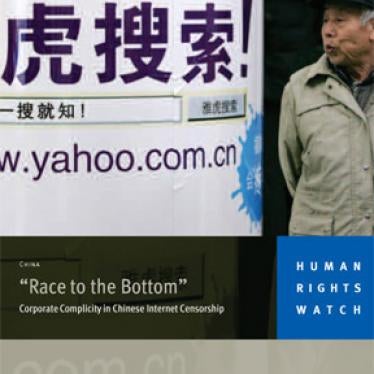(New York) - A new voluntary standard that internet and telecom companies have agreed on could help safeguard freedom of expression and human rights in China and other countries where the internet is censored, Human Rights Watch said today.
Participants in the Global Network Initiative (GNI) include Human Rights Watch, Google, Microsoft, Yahoo, and a host of other major companies, human rights organizations, investors, and academics.
In countries such as China, Iran, and Russia, governments regularly censor information and persecute bloggers and other online activists whom they see as a threat to their rule. In some cases, companies have been complicit in those abuses. China, for example, has pressured Yahoo to turn over to its secret police the names of political dissidents who send information over e-mail that it considers sensitive.
"This is an important first step to protect human rights and free expression on the internet," said Arvind Ganesan, director of the Business and Human Rights Program at Human Rights Watch. "But the real test will be in its implementation, and whether mandatory measures are included to protect internet users."
In 2005, the Chinese journalist Shi Tao was sentenced to 10 years in prison after being identified to the authorities by Yahoo. Shi had sent an overseas website the notes on a memorandum issued by China's propaganda department on how the media should cover the 15th anniversary of the Tiananmen Square crackdown. China has also pressured Microsoft to shut down internet blogs in which Chinese users were criticizing their government, and insisted Google censor its search engine results.
The GNI was founded to help combat these problems globally by setting out standards companies should follow to curtail censorship and protect user privacy. Its Principles on Freedom of Expression and Privacy are accompanied by specific implementation commitments and a commitment to monitor compliance with this standard.
Human Rights Watch said the launch of the GNI is an important development in combating online censorship and protecting user privacy, but that it will take time to implement and more will be needed, including the addition of mandatory rules.







